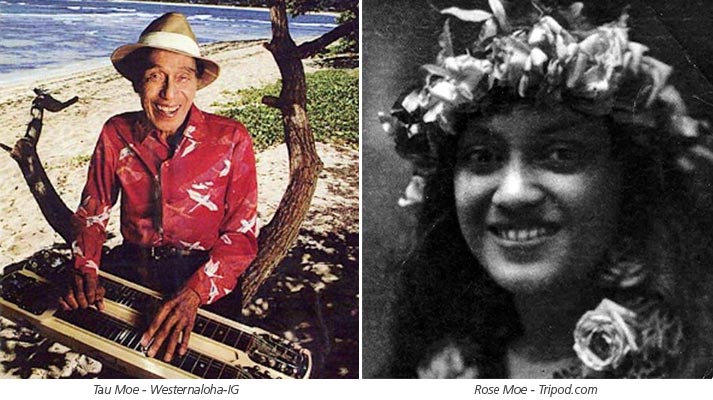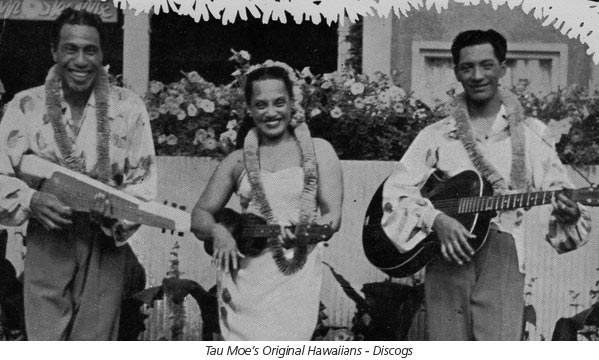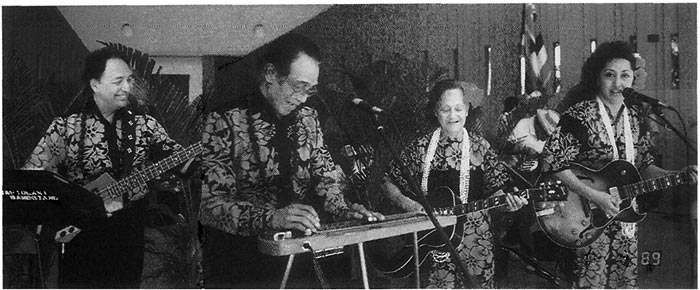

Tau Moe
November 13, 2024 • Nate Goore • Steel Guitar History
Tau Moe and his wife, Rose Moe, spent over six decades traveling the world, sharing their music, and representing their Polynesian heritage. Their story is one of talent, determination, and an unshakable bond that carried them through their remarkable careers as performers on the global stage.

Early Life and Musical Beginnings
Tau Moe was born on August 13, 1908, in Pago Pago, Samoa, into a family of Mormon missionaries. His upbringing was deeply rooted in both religion and music, with his father training him and his siblings to become musically literate. At that time, it was uncommon for Polynesians to read and write music, but Tau and his siblings broke the norm through their father's teachings. Tau's early musical exposure came through church choirs and instruments, laying the foundation for his future career.
When Tau was 11 years old, his family relocated to La‘ie, Hawai‘i. There, the influence of local and international cultures further fueled his passion for music. A key figure during this period was Madame Claude Rivier, a French professor and music enthusiast who held parties showcasing Polynesian music. Tau began performing in her shows, traveling weekly from La‘ie to Honolulu. This marked his first professional gig, and it was during this time that his love for the steel guitar blossomed.
The Formation of Tau and Rose Moe's Partnership
One of the pivotal moments in Tau's life occurred when he met Rose, a fellow student of steel guitar under the tutelage of M.K. Moke. Rose was born on August 11, 1908, in Kohala on the island of Hawai'i. After losing her mother at a young age, she and her sisters moved to Honolulu, where they became involved in local entertainment. It was through their mutual love of music that Tau and Rose's partnership began, both professionally and personally.
In December 1927, Tau and Rose joined Madame Rivier's troupe and embarked on what would become a lifelong adventure of travel and performance. The troupe left Hawai'i to perform in the Philippines, unaware that they wouldn't return to live in their homeland for another 60 years.
A Life of Global Performances
The troupe's travels took them across Asia, and it was during this time that Tau and Rose's first child, Lani, was born in Kyoto, Japan. As they moved from country to country, their family grew, and their performances adapted to local cultures. Tau and Rose not only mastered the steel guitar, but they also immersed themselves in local traditions, often learning the languages and customs of the countries they visited. This cultural adaptability contributed to their success and popularity wherever they performed.
By the 1930s, Tau had taken over as the steel guitarist in the troupe, and the family's reputation as entertainers flourished. They spent significant time performing in Asia and Europe, notably living in Turkey, Romania, and Germany for extended periods. Their performances included a wide range of musical genres, but Hawaiian music always remained at the heart of their act. As they performed, they often represented Polynesian culture to audiences who had never before encountered it, cementing their place as pioneers of Hawaiian music abroad.
Challenges During World War II
The outbreak of World War II posed significant challenges for the Moe family. They were in Europe when the war began, and the shifting political landscape forced them to make difficult decisions. At one point, they were nearly trapped in Germany as anti-American sentiments grew. Their Polynesian heritage, however, often provided them with protection, as locals identified them more with their music than with political affiliations. The family made a harrowing escape through various countries, eventually finding temporary refuge in India during the war years.
Despite the global turmoil, the Moe family continued performing, with their son Lani joining them on stage as a young entertainer. They worked in India for much of the war, entertaining both local audiences and stationed troops. Lani, though just a teenager, became an integral part of their act, contributing both musically and through dance.

Post-War Success and Global Influence
After the war, the family continued their global tour, performing in Europe, the Middle East, and Asia. Their act, which combined music, dance, and acrobatics, became increasingly sophisticated over the years. They frequently collaborated with other renowned performers and performed for heads of state and royalty.
During their time in Europe, the family made a name for themselves in the elite circles of Paris, London, and Brussels. They performed in prestigious venues and worked alongside famous entertainers such as Maurice Chevalier and Josephine Baker. Their reputation as the "Aloha Four," which included their children, Lani and Dorian, solidified their place in the international entertainment world.
Throughout their travels, Tau and Rose made numerous recordings and appeared on television and radio shows across various countries. Their style remained versatile, capable of adjusting to the musical preferences of the regions they visited. Even in countries where loud, modern music was the norm, Tau's steel guitar performances were always a hit, providing a unique contrast to the prevailing trends.
Return to Hawai‘i and Legacy
In the 1970s, after more than four decades abroad, Tau felt a strong pull to return to his homeland. Despite their success in Europe, he made the decision to bring his family back to Hawai'i. The family's return was both a homecoming and a new chapter, as they reintegrated into the Hawaiian music scene while continuing to perform internationally.

Tau and Rose's influence on the global perception of Hawaiian music cannot be overstated. They were among the first Polynesian musicians to introduce Hawaiian steel guitar to audiences in remote parts of the world. Their ability to connect with people through music, regardless of nationality or background, made them true ambassadors of Hawaiian culture.
Tau and Rose Moe's extraordinary lives were defined by their talent, resilience, and love for music. From humble beginnings in Hawai'i and Samoa, they rose to become international stars, traveling across continents and leaving a lasting legacy in the world of Hawaiian music. Their ability to adapt to diverse cultures while staying true to their Polynesian roots helped them to transcend the limitations of their time, ensuring that their music would continue to resonate with audiences long after their final performance.
FEATUREArchives
February, 2026
January, 2026
December, 2025
November, 2025
October, 2025
September, 2025
Complete Issue Archive
Complete Series Archive
Categories
Education and TrainingEntertainment
Equipment
Festivals and Conventions
Instruments and Luthiers
News
Steel Guitar History
Authors
Author IndexHIMELE Events
2026 Festivals and Workshops
Hawaiian Steel Guitar Festival at Ka Makana Ali‘iFebruary 28, 2026 – 11:00 AM - 3:00 PM HST (Rescheduled)
Ka Makana Ali‘i Shopping Center, Kapolei
Hilo Steel Guitar Festival
March 7, 2026 – 11:00 AM - 3:15 PM HST
Prince Kuhio Plaza, Hilo, Hawai‘i
Hawaiian Steel Guitar Festival - Keiki Kine
April 4, 2026 – 11:00 AM - 1:00 PM HST
Ka Makana Ali‘i Shopping Center, Kapolei
Kaua‘i Steel Guitar Festival
May 10, 2026 - 11:00 AM - 3:00 PM HST
Kukui Grove Center, Lihue, Hawai‘i
Hawaiian Steel Guitar Festival at Windward Mall
June 13, 2026 – 10:00 AM - 3:00 PM HST *
Windward Mall, Kane‘ohe
Royal Hawaiian Center Presents Waikīkī Steel Guitar Week - July 5-11, 2026
July 6-9, 2026 – 5:30 PM - 6:30 PM HST (Nightly Concerts)
Royal Grove Stage, Royal Hawaiian Center, Waikīkī
Royal Hawaiian Center Presents J-FESTA - Japan-Hawaiian Steel Guitar Festival
July 10, 2026 – 2:30 PM - 6:30 PM HST
Royal Grove Stage, Royal Hawaiian Center, Waikīkī
Royal Hawaiian Center Presents Waikīkī Steel Guitar Festival
July 11, 2026 – 11:00 AM - 2:30 PM and 4:00 PM - 6:30 PM HST
Royal Grove Stage, Royal Hawaiian Center, Waikīkī
Hawaiian Steel Guitar Festival - Keiki Kine at Kahala Mall
August 15, 2026 – 11:00 AM - 1:00 PM HST *
Kahala Mall, Honolulu, Hawai‘i
Maui Steel Guitar Festival
October 17, 2026 - 3:00 PM - 6:30 PM HST
The Shops At Wailea, Wailea, Hawai‘i
Hawai‘i Island Steel Guitar Experience at Mauna Lani
November 19-22, 2026 – Mauna Lani, Auberge Resorts Collection, Waimea, Hawai‘i Island
2026 Hawaiian Steel Guitar Showcase Livestream Broadcasts


All broadcasts originate from the Hawaiian Steel Guitar Showcase Facebook Page and YouTube Channel.
Hawaiian Steel Guitar Festival at Ka Makana Ali‘i
February 28, 2026 – 11:00 PM - 3:00 PM HST (Rescheduled)
Hilo Steel Guitar Festival
March 7, 2026 – 11:00 AM - 3:15 PM HST
Hawaiian Steel Guitar Festival - Keiki Kine at Ka Makana Ali‘i
April 4, 2026 – 11:00 AM - 1:00 PM HST
Hawaiian Steel Guitar Festival at Windward Mall
June 13, 2026 – 10:00 AM - 3:00 PM HST *
Royal Hawaiian Center Presents Japan-Hawaiian Steel Guitar Festival (J-FESTA)
July 10, 2026 – 2:30 PM - 6:30 PM HST
Royal Hawaiian Center Presents Waikīkī Steel Guitar Festival
July 11, 2026 – 11:00 AM - 2:30 PM and 4:00 PM - 6:30 PM HST
Hawaiian Steel Guitar Festival - Keiki Kine at Kahala Mall
August 15, 2026 – 11:00 AM - 1:00 PM HST *
Hawai‘i Island Steel Guitar Experience at Mauna Lani
November 20, 2026 - Ho‘olaule‘a concert – 4:00 PM - 8:00 PM HST
November 21, 2026 - Open Stage Performances – 11:30 AM - 3:00 PM HST
Other Events
2026 Events
Steel Guitar FridaysEvery Friday – 5:30 PM - 6:30 PM
Royal Grove Stage, Royal Hawaiian Center, Waikīkī
Steel Guitar Sundays
January 5, February 2, March 2, April 6, May 4, and June 1, 2026 – 10:00 AM - Noon
Hula Grill Waikiki, Waikīkī
AISGC Hawaiian Steel Guitar Festival #
July 23-25, 2026
WInchester Towne Square Community Centre, Winchester, Indiana
* Tentative
# Registration Fee Required
Copyright ©2024 by Hawaii Institute for Music Enrichment and Learning Experiences, Inc., and Cyberventures Unlimited.Terms of Use
About HIMELE
HIMELE is a Hawai‘i non-profit corporation that supports music enrichment and education for people of all ages. Our purpose is to educate, promote, and perpetuate Hawaiian music, Hawaiian culture and Hawaiian musical instruments.
Visit HIMELE
Board of Directors
Mission Statement
Support Us
Learning Resources
Ke Kula Mele Hawai‘i
Hawaiian Steel Guitar Symposium
Statewide Festivals
Kaua‘i Steel Guitar Festival
Maui Steel Guitar Festival
Waikīkī Steel Guitar Week
Hawai‘i Island Steel Guitar Festival
Japan-Hawaiian Steel Guitar Festival
Kona Steel Guitar Festival
Community Festivals
Ka Makana Ali‘i – Kapolei
Windward Mall – Kāne‘ohe
Keiki Kine at Kahala Mall
Keiki Kine at Ka Makana Ali‘i
Livestream Hawaiian Steel Guitar Showcase